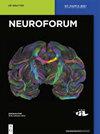食物奖励和肠道-大脑信号
Q3 Medicine
引用次数: 3
摘要
越来越多的超加工、能量密集的食品正在导致肥胖的蔓延,这是当今世界严重的健康威胁。造成这种联系的一个可能原因是,大脑天生就会从吃东西中获得快乐。具体来说,食物摄入激活了多巴胺受体信号的奖赏通路。特定食物的强化价值源于味道和营养特性之间的相互作用。越来越多的证据表明,营养价值在肠道中通过肠道和肝门静脉的化学感受器感知,并通过神经元和内分泌途径传递给大脑,以指导食物选择行为。超加工食品被设计成通过高脂肪和高糖的组合来增强奖励反应,因此看起来非常开胃。越来越多的证据表明,过度食用加工食品会扭曲正常的奖励信号,导致强迫性饮食行为和肥胖。因此,了解食物奖励和肠道-大脑信号对于找到对抗肥胖流行的有效策略至关重要。本文章由计算机程序翻译,如有差异,请以英文原文为准。
Food reward and gut-brain signalling
Abstract The increasing availability of ultra-processed, energy dense food is contributing to the spread of the obesity pandemic, which is a serious health threat in today’s world. One possible cause for this association arises from the fact that the brain is wired to derive pleasure from eating. Specifically, food intake activates reward pathways involving dopamine receptor signalling. The reinforcing value of specific food items results from the interplay between taste and nutritional properties. Increasing evidence suggests that nutritional value is sensed in the gut by chemoreceptors in the intestinal tract and the hepatic portal vein, and conveyed to the brain through neuronal and endocrine pathways to guide food selection behaviour. Ultra-processed food is designed to potentiate the reward response through a combination of high fat and high sugar, therebye seeming highly appetizing. There is increasing evidence that overconsumption of processed food distorts normal reward signalling, leading to compulsive eating behaviour and obesity. Hence, it is essential to understand food reward and gut-brain signalling to find an effective strategy to combat the obesity pandemic.
求助全文
通过发布文献求助,成功后即可免费获取论文全文。
去求助
来源期刊

Neuroforum
NEUROSCIENCES-
CiteScore
1.70
自引率
0.00%
发文量
30
期刊介绍:
Neuroforum publishes invited review articles from all areas in neuroscience. Readership includes besides basic and medical neuroscientists also journalists, practicing physicians, school teachers and students. Neuroforum reports on all topics in neuroscience – from molecules to the neuronal networks, from synapses to bioethics.
 求助内容:
求助内容: 应助结果提醒方式:
应助结果提醒方式:


